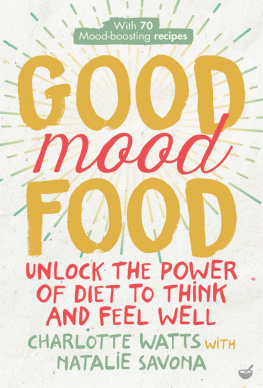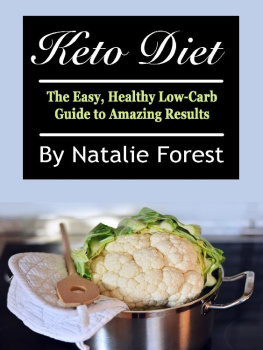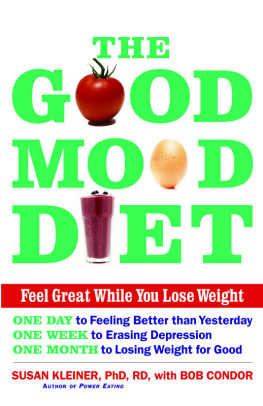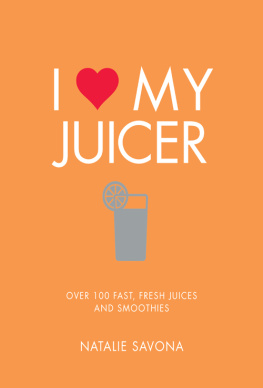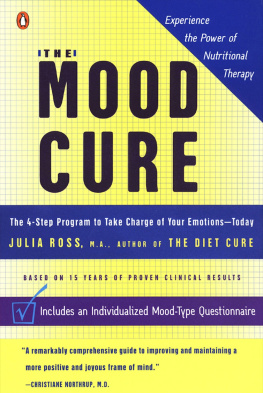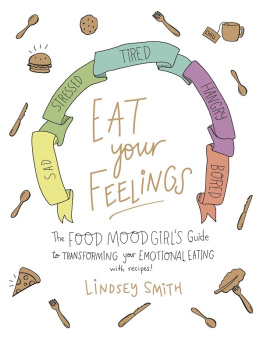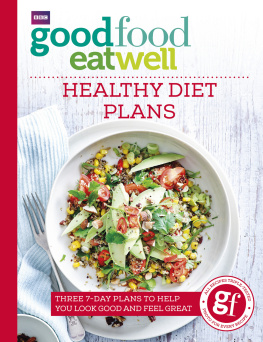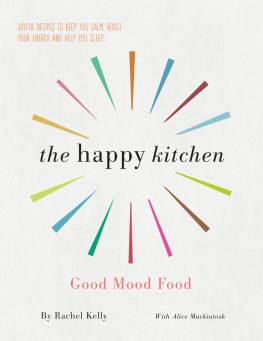Natalie Savona) - Good Mood Food: Unlock the power of diet to think and feel well
Here you can read online Natalie Savona) - Good Mood Food: Unlock the power of diet to think and feel well full text of the book (entire story) in english for free. Download pdf and epub, get meaning, cover and reviews about this ebook. year: 0, genre: Home and family. Description of the work, (preface) as well as reviews are available. Best literature library LitArk.com created for fans of good reading and offers a wide selection of genres:
Romance novel
Science fiction
Adventure
Detective
Science
History
Home and family
Prose
Art
Politics
Computer
Non-fiction
Religion
Business
Children
Humor
Choose a favorite category and find really read worthwhile books. Enjoy immersion in the world of imagination, feel the emotions of the characters or learn something new for yourself, make an fascinating discovery.
- Book:Good Mood Food: Unlock the power of diet to think and feel well
- Author:
- Genre:
- Year:0
- Rating:4 / 5
- Favourites:Add to favourites
- Your mark:
- 80
- 1
- 2
- 3
- 4
- 5
Good Mood Food: Unlock the power of diet to think and feel well: summary, description and annotation
We offer to read an annotation, description, summary or preface (depends on what the author of the book "Good Mood Food: Unlock the power of diet to think and feel well" wrote himself). If you haven't found the necessary information about the book — write in the comments, we will try to find it.
Good Mood Food: Unlock the power of diet to think and feel well — read online for free the complete book (whole text) full work
Below is the text of the book, divided by pages. System saving the place of the last page read, allows you to conveniently read the book "Good Mood Food: Unlock the power of diet to think and feel well" online for free, without having to search again every time where you left off. Put a bookmark, and you can go to the page where you finished reading at any time.
Font size:
Interval:
Bookmark:
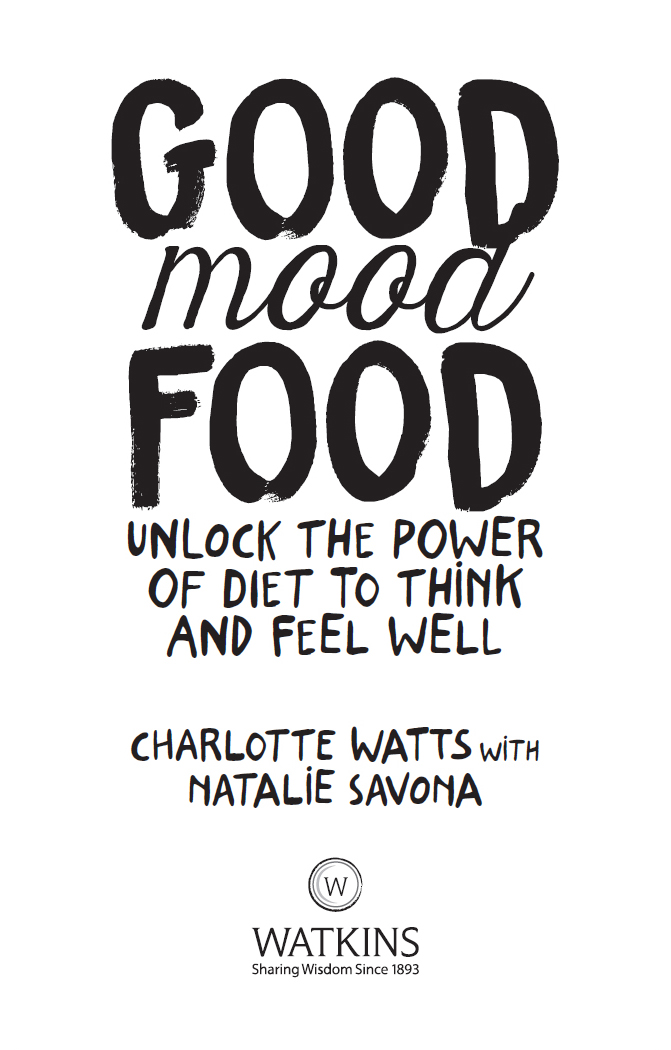
CONTENTS
INTRODUCTION
Welcome to this book, which Ive designed to support your good mood, but also along the way I hope it will inspire an interest in nutritious and delicious food. Understanding how what we eat changes how we feel, can help us tune into the very real effects of nutrition, and so motivate us to make the best choices. Mood disorders are now affecting more of us than ever before, but through exploration of the nutritional factors that contribute to them, we are able to see practical, realistic and sustainable antidotes to conditions that interfere with our quality of life.
Natalie Savona, author of The Kitchen Shrink, and I studied and tutored at the same college (the Institute for Optimum Nutrition, London) and we have similar outlooks for nutrition, believing that it is most importantly about enjoying food and tuning into our individual needs and that this approach can only support mood if we respond deeply to a sense of self-care and awareness. Although Natalie has moved on from nutrition now, I was delighted to be able to pick up her mantel and create a new work for this new time, using the content of her excellent book. Since the publication of Natalies book in 2010, we have begun to understand even more of the mechanisms and links between the ways we eat, live, respond and our mental outlook, so Good Mood Food features more up-to-date information.
Conditions that affect your mood, mind and energy come in many forms and even more degrees of seriousness. It may be that you feel persistently low; you may find that you are often irritable or turning to food for a boost; you may suffer from premenstrual syndrome or seasonal affective disorder; you may have difficulty sleeping or perhaps you are finding that your brain power is not what it used to be. One thing that all these various problems have in common is that they are inextricably linked to your diet. Throughout this book, we will help you to sustain a more buoyant mood by examining in detail a number of the more common mood-related conditions, such as insomnia and cravings, and exploring how to overcome them using nutritional methods.
We have all felt low at some time or another it is absolutely normal to feel sad following a bereavement, at the end of a relationship, the loss of a job, a disappointment or a severe illness. However, for some people this sense of sadness goes on for months on end and permeates every aspect of their lives, leaving them unable to truly enjoy anything they do. They can even suffer from physical symptoms, such as fatigue, sleep problems and a change in appetite. Sometimes the sadness does not even have an obvious trigger, it just comes from nowhere in particular and lingers. Such a persistent mood disturbance may continue as mild depression for years, or in some cases it may be so severe that the sufferer is barely able to cope with normal daily life. This problem is more common than you might think as much as one-fifth of the adult population in Europe and North America are thought to suffer from some degree of depression.
Mood disorders are notoriously difficult to categorize and deal with using conventional medical approaches, because they can be triggered by countless different sources. It is clear that the physical and psychological aspects of conditions such as depression and anxiety are closely linked. Major life events have an impact on our physical health, which in turn may affect our emotions, particularly in the long term, and so it is clear that any approach to redressing mood imbalances must take into account both the physical and psychological aspects. In reality, these are not two separate things, because every emotion we feel ripples through our body, and physical experience always involves the mind, too. To reiterate this point in this book, we use the term mind-body.
Although the primary focus of this book is physiological strategies based on food, you will also find advice on how you can talk through problems (see pages ). Anyone suffering from conditions such as severe depression should visit their doctor for a full medical evaluation, to ensure that any other treatment be it drugs or psychotherapy can be supported and can fully work with your nutritional strategies too. Adhering to the basic principles of healthy eating can make the healthiest of people feel even better, too. It follows that if you provide your body with good-quality fuel and minimize your intake of substances that silt up your system, both your body and mind will work more efficiently for you. Much research has shown that diet and food supplements can relieve or even eliminate symptoms of all kinds of illnesses, not least those affecting the way our minds work.
Clearly, a diet that is rich in nutrients can improve your brain function and help you to combat low moods, but how can you ensure that your intake of nutrients is adequate? One school of thought is that if you have a balanced diet you are getting all the nutrients you need. However, it is important to remember that a great many of us do not actually eat this mythical (and often confusing) idea of a balanced diet or understand what it might actually be. When many people under stress and time pressures are grabbing a sugary muffin for breakfast, nibble biscuits mid-morning, have a sandwich for lunch and then eat a ready-made meal in the evening, there is plenty of room for awareness. Even if our diet is not that bad, too few of us eat a varied diet of fresh, unprocessed, nutrientrich foods most of the time. With our time pulled away by screens and ever-increasing amounts of information, redirecting this attention towards how we look after and nourish ourselves can have a truly great effect on our quality of life.
Knowing some basic requirements can help to guide you. Most governments have set recommended daily amounts of vitamins that each of us require, based on our sex and age. But the truth is that nobody knows exactly how much each of us needs, especially given our individual lifestyles, exercise routines and environments. We do know that our ancestors would have eaten different types of food on different days and throughout the changing seasons, and that their calorie intake would have varied greatly day to day, so that the idea of set mealtimes for each day doesnt follow the variations that our biology and metabolisms now expect. Our ancestors would have also had nutrient-dense food with none of the sugar and processed or junk food that we eat.
The government nutrient recommendations are probably conservative estimates and are generally aimed at the minimum amounts of micro-nutrients required to prevent the symptoms of deficiencies, rather than to optimize health. Worryingly, research worldwide has shown that significant numbers of men, women and children are currently not even getting these minimum recommended daily amounts of nutrients.
For example, one survey in the UK found that 72 per cent of women and 42 per cent of men did not have an adequate intake of magnesium (this calming mineral is discussed much in this book). As for the macro-nutrients protein, fats and carbohydrates most people in developed countries do get enough of these from their diet. That said, the form in which macro-nutrients are commonly consumed is often not healthy. Many people tend to eat refined flour in bread, high-fat animal protein and excess animal fats or fats that have been processed; many of the micro-nutrients contained in these foods have been lost during processing.
We are also exposed to many anti-nutrients substances that deplete our stock of nutrients when they are processed in our bodies and that can add to stress on the mind-body and throw regulation of neurotransmitters (brain chemicals) and hormones out of whack. Fizzy drinks, sugar, coffee, tea, alcohol and cigarettes interfere with our bodys ability to absorb minerals, as well as keeping us in cycles of craving the highs of these stimulants and leaving us at the whim of a rollercoaster ride of mood and energy. So much of what we explore in this book isnt simply what is good or bad; not what we
Font size:
Interval:
Bookmark:
Similar books «Good Mood Food: Unlock the power of diet to think and feel well»
Look at similar books to Good Mood Food: Unlock the power of diet to think and feel well. We have selected literature similar in name and meaning in the hope of providing readers with more options to find new, interesting, not yet read works.
Discussion, reviews of the book Good Mood Food: Unlock the power of diet to think and feel well and just readers' own opinions. Leave your comments, write what you think about the work, its meaning or the main characters. Specify what exactly you liked and what you didn't like, and why you think so.

